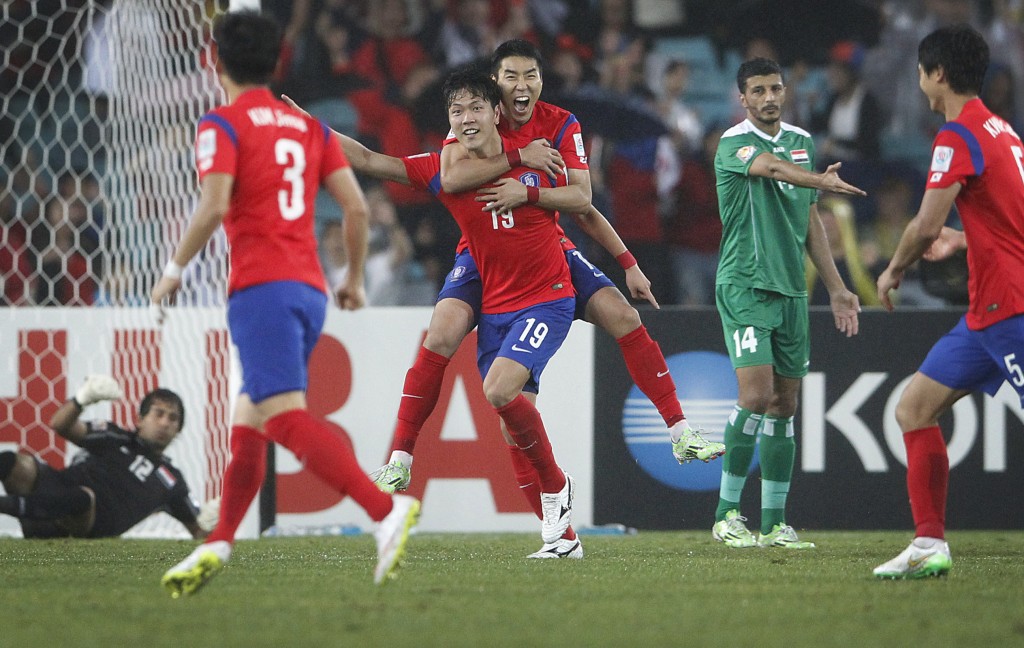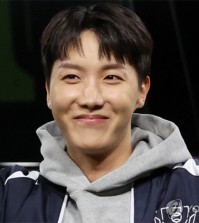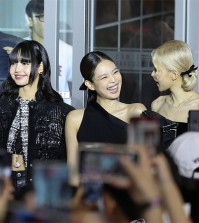- California Assembly OKs highest minimum wage in nation
- S. Korea unveils first graphic cigarette warnings
- US joins with South Korea, Japan in bid to deter North Korea
- LPGA golfer Chun In-gee finally back in action
- S. Korea won’t be top seed in final World Cup qualification round
- US men’s soccer misses 2nd straight Olympics
- US back on track in qualifying with 4-0 win over Guatemala
- High-intensity workout injuries spawn cottage industry
- CDC expands range of Zika mosquitoes into parts of Northeast
- Who knew? ‘The Walking Dead’ is helping families connect
S. Korea looking to end half-century Asian Cup drought vs. Australia

South Korea’s Lee Jeong-hyeop, center back, hugs his team mate Kim Young-gwon, after Kim scored his country’s second goal during the AFC Asian Cup semifinal soccer match between South Korea and Iraq in Sydney, Australia, Monday, Jan. 26, 2015. (AP Photo/Quentin Jones)
SYDNEY (Yonhap) — The undefeated South Korean squad will look to cap off an improbable run at the AFC Asian Cup with a victory over the host Australia in the championship final on Saturday.
The kickoff at Stadium Australia will be 8 p.m. local time, 6 p.m. in Seoul and 1 a.m. PT. The two nations are meeting for the second time this tournament; South Korea, ranked 69th, beat the 100th-ranked Australia 1-0 in the final Group A match on Jan. 17 to clinch the group’s top seed.
South Korea is gunning for its first Asian Cup title since 1960. This is the country’s first appearance in the final in 27 years.
Australia, which is playing in the Asian Cup for the third time, has made it to the final for the second straight tournament. The Socceroos lost to Japan in the 2011 final in Qatar.
Both nations had secured spots in the knockout stage prior to their showdown, and Australia coach Ange Postecoglou rested key players such as Tim Cahill and Robbie Kruse at the start of the match.
South Korea coach Uli Stielike has said he expects to see a much different Australian team in the final because Postecoglou won’t bench the likes of Cahill to start the final with the championship in front of home fans at stake.
Stielike’s players, though, have sounded more confident, saying they know what it takes to beat the host country.
South Korea has strung together five consecutive clean sheets at the tournament so far and has scored seven times in that span. The country had a lethargic start to the campaign with an underwhelming 1-0 victory over Oman and then what Stielike said was a “lucky” 1-0 win over Kuwait in group stage.
The players picked up their defensive intensity against Australia. Then, facing Uzbekistan in the quarterfinals, winger Son Heung-min, held scoreless in group stage, came through with two extra-time goals in the 2-0 win.
Then in the semifinals against Iraq, forward Lee Jeong-hyeop, an Asian Cup rookie who had netted the winner versus Australia, scored in the first half as South Korea went on to prevail 2-0.
Along the way, Stielike has lost two key veterans to injuries. Midfielder Lee Chung-yong suffered a hairline fracture to his right tibia in a hard tackle against Oman and never played another game. Another midfielder, Koo Ja-cheol, tore a ligament in his right elbow in an awkward fall against Australia and was promptly ruled out of the tournament.
South Korea hasn’t lost a beat, however, and Lee Jeong-hyeop has emerged as an unlikely source of offense.
The 23-year-old had never before played for South Korea in any age group and he had mostly been a reserve forward on his domestic military club, Sangju Sangmu. Stielike selected him much to the surprise of many observers, and Lee has so far made his coach look like a genius.
South Korea’s defense has settled down after a rough start. Stielike had frequently tinkered with his defensive pairings but appears to have settled on Kwak Tae-hwi and Kim Young-gwon as his center backs, and Kim Jin-su and Cha Du-ri as his fullbacks.
Kim Jin-su and Cha have enjoyed a fine campaign. Kim is the only South Korean to have played every minute of the tournament so far, and has done excellent work on defensive coverage while also contributing on offense. He assisted on eventual winners in both the quarterfinals and semifinals.
Cha, the oldest member of the team at 34, has turned back the clock in Australia. He has turned a handful of defenders into pylons with his bursts of speed, and has literally thrown his body around on defense to get into passing and shooting lanes.
Cha has said he would retire from international play after the Asian Cup, though fans are calling on him to stay with the national team.
Kim Jin-hyeon has cemented his status as the new No. 1 man in goal and should get another start in the final.
He will stare down a balanced Australian team, on which 10 different players have combined for 12 goals.
Cahill, a veteran of 81 matches and 39 goals, is a lethal finisher. Kruse, a teammate of South Korean winger Son Heung-min’s on Bayer Leverkusen, can also be a weapon, while Massimo Luongo has emerged as an effective playmaker.
Captain Ki Sung-yueng, a stalwart in midfield, has said the only advantage Australia has over South Korea is playing at home, and that South Korea has the mental strength to overcome the one last hurdle.
















